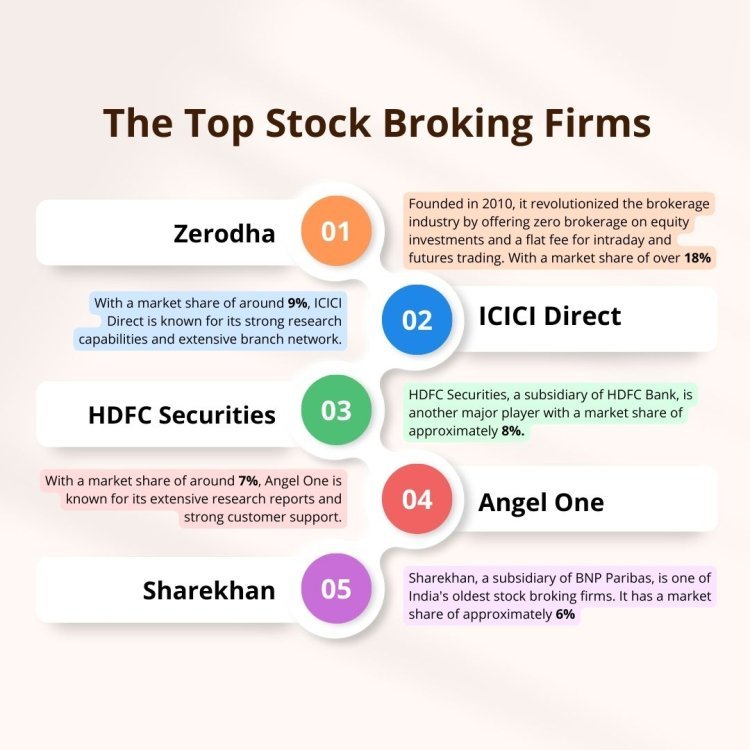The Top Stock Broking Firms in the Market with Growth Factors
The future of the stock broking industry in India looks promising, with ample opportunities for growth and development. The increasing penetration of internet and smartphones, coupled with regulatory support, is likely to bring more investors into the fold, making stock trading an integral part of India's financial ecosystem. As investors become more savvy and technology continues to advance, the Indian stock broking industry is poised to reach new heights, contributing significantly to the country's economic growth and financial stability.

India's stock broking industry has seen exponential growth over the past few decades, evolving from a tightly controlled sector to a highly competitive and technology-driven marketplace. As of 2024, the Indian stock broking market is estimated to be worth approximately USD 3 billion, with a compound annual growth rate (CAGR) of around 10-12% over the past five years. This growth trajectory highlights the increasing participation of retail investors, the proliferation of digital trading platforms, and the rising financial literacy among the Indian population.

The Indian stock market, comprising the Bombay Stock Exchange (BSE) and the National Stock Exchange (NSE), has witnessed significant participation, with over 100 million registered investors. This surge is propelled by the ease of online trading, favorable government policies, and the advent of mobile trading apps that have democratized access to stock markets. The penetration of internet and smartphones has further fueled this growth, making stock trading accessible even in remote parts of the country.
Read About- The Top Bath Fittings Manufacturers in India
Growth Factors
Several factors have contributed to the robust growth of stock broking companies in India:
1. Digital Transformation
The advent of technology has revolutionized the stock broking industry. The transition from traditional brokerage methods to online trading platforms has made stock trading more accessible and convenient. Mobile trading apps and user-friendly interfaces have attracted a younger demographic, leading to an increase in retail investors.
2. Financial Literacy
Government initiatives and efforts by financial institutions to improve financial literacy have borne fruit. Awareness campaigns and educational programs have empowered individuals to make informed investment decisions, thereby increasing market participation.
3. Regulatory Reforms
The Securities and Exchange Board of India (SEBI) has implemented several reforms to protect investors and ensure transparency in trading activities. Initiatives such as the introduction of margin trading, the reduction of transaction costs, and the implementation of strict compliance measures have boosted investor confidence.
4. Economic Growth
India's burgeoning economy has provided a conducive environment for stock market growth. Economic reforms, a stable political environment, and a focus on infrastructure development have attracted both domestic and foreign investors. The growth in sectors such as IT, pharmaceuticals, and manufacturing has also contributed to stock market expansion.
5. Rise of Mutual Funds
The popularity of mutual funds as an investment avenue has indirectly boosted the stock broking industry. Systematic Investment Plans (SIPs) have encouraged regular investment habits among the populace, leading to a steady inflow of funds into the stock markets.
6. Global Integration
India's integration into the global economy has opened up new avenues for stock market growth. Foreign Direct Investment (FDI) inflows, collaborations with international financial institutions, and the listing of Indian companies on global stock exchanges have increased market dynamism.
Top Firms with Market Share
The Indian stock broking industry is highly competitive, with several firms vying for market dominance. Here are some of the top stock broking companies in India, along with their market share:
1. Zerodha
Zerodha has emerged as the largest stock broker in India by active clients. Founded in 2010, it revolutionized the brokerage industry by offering zero brokerage on equity investments and a flat fee for intraday and futures trading. With a market share of over 18%, Zerodha's success is attributed to its innovative technology, transparent pricing, and customer-centric approach.
2. ICICI Direct
A subsidiary of ICICI Bank, ICICI Direct is a prominent player in the stock broking industry. It offers a comprehensive suite of investment options, including equities, derivatives, mutual funds, and fixed deposits. With a market share of around 9%, ICICI Direct is known for its strong research capabilities and extensive branch network.
3. HDFC Securities
HDFC Securities, a subsidiary of HDFC Bank, is another major player with a market share of approximately 8%. It provides a wide range of financial services, including stock broking, portfolio management, and financial advisory. HDFC Securities' robust online trading platform and customer service have made it a preferred choice for investors.
4. Angel One (formerly Angel Broking)
Angel One is a leading full-service retail broking house in India. It offers a wide array of financial products and services, including stock broking, portfolio management, and investment advisory. With a market share of around 7%, Angel One is known for its extensive research reports and strong customer support.
5. Sharekhan
Sharekhan, a subsidiary of BNP Paribas, is one of India's oldest stock broking firms. It has a market share of approximately 6% and offers a range of services, including equities, derivatives, mutual funds, and portfolio management. Sharekhan's robust trading platform and research capabilities have garnered a loyal customer base.
6. Kotak Securities
Kotak Securities, a subsidiary of Kotak Mahindra Bank, holds a market share of about 5%. It provides a variety of investment options, including equities, derivatives, mutual funds, and fixed deposits. Known for its advanced trading tools and research insights, Kotak Securities caters to both retail and institutional investors.
7. Motilal Oswal Financial Services
Motilal Oswal Financial Services is a prominent name in the stock broking industry with a market share of around 4%. It offers a comprehensive range of financial services, including stock broking, portfolio management, and investment advisory. Motilal Oswal's strong research and advisory services have made it a trusted name among investors.
8. 5Paisa
5Paisa, a discount brokerage firm, has gained popularity for its low-cost trading services. With a market share of approximately 3%, 5Paisa offers a range of financial products, including equities, derivatives, and mutual funds. Its user-friendly trading platform and competitive pricing have attracted a significant number of retail investors.
Read about -The Digital Payment Apps in India: Market Size, Growth Rate, and Future Prospects
Conclusion
The stock broking industry in India is on a robust growth trajectory, driven by technological advancements, increased financial literacy, and favorable economic conditions. Companies like Zerodha, ICICI Direct, and HDFC Securities are leading the charge with innovative solutions and customer-centric services. As the market continues to evolve, the entry of new players and the adoption of advanced technologies like artificial intelligence and blockchain are expected to further enhance the trading experience and expand market participation.
What's Your Reaction?











![Wireless Connectivity Software Market Size, Share | Statistics [2032]](https://handyclassified.com/uploads/images/202404/image_100x75_661f3be896033.jpg)


